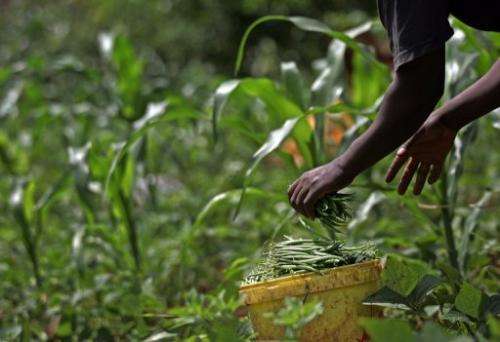Dustbin to dinner: ministers served binned food

The green beans are fresh, the broccoli crunchy and the baby corn sweet, but having failed "cosmetic" tests of international supermarkets, the Kenyan-grown food was hurled out as waste.
On Tuesday however, vegetables considered too ugly for shop-shelves were served at a special dinner for some 100 global environment ministers and top-level delegations to highlight the "scandal" of large scale but entirely unnecessary food wastage.
The meal, held at the Nairobi-based UN Environmental Programme (UNEP), was organised by anti-food waste campaigner Tristram Stuart, who collected some 1,600 kilogrammes of unwanted fruit and vegetables in Kenya for the meal.
"No economic, environmental or ethical argument can be made to justify the extent of food waste," UNEP chief Achim Steiner told the dinner, where the previously binned food was served up by top chefs.
UNEP is campaigning to slash the current 1.3 billion tonnes of food lost or wasted each year as part of efforts to ease the environmental impact on an "already straining global food system".
Kenya is a key market for export of fresh vegetables to European supermarkets, especially to Britain.
But similar displays of the "disproportionate power of supermarkets" over farmers producing for export are found worldwide, Stuart said, showing images of rotting bananas in Ecuador, oranges in Florida or tomatoes in Tenerife.
"It is a huge scandal, but also a huge opportunity" for change, said Stuart, who said he was "genuinely shocked and distressed" at the amount of vegetables in Kenya rejected by supermarkets and thrown away.
Stuart criticised the "particularly pernicious practices" of international supermarkets with overly strict standards for appearance that will bin beans for being too long or not green enough.
Supermarkets also cancel orders after vegetables had been harvested, added Stuart, a British environmental campaigner who created the 'Feeding the 5,000' organisation to encourage cuts in food waste.
While some unwanted produce is sold on the local market or donated, so much is rejected that much is left to rot or fed to livestock, prompting resentment amongst Kenyan farmers hit with the lost revenue, he added.
And some producers sign contracts with supermarket chains that block them from selling unwanted food on local markets or even donating it to charities, with farmers allowed only to use the vegetables for animal feed.
"If it happens in Kenya, it is also happening elsewhere in Africa, in Asia and Latin America," said UNEP spokesman Nick Nuttall. "This could be just the tip of the iceberg."
One farmer supplying a British supermarket chain said he wasted up to 40 tonnes of vegetables every week, or 40% of his production, Stuart said.
Many of the vegetables are for international, not Kenyan or local tastes, meaning there is a limited market for crops such as baby corn.
But while ministers—including top ministers from Europe—may peer at their plates for curly carrots or peculiarly shaped parsnips, they will notice little different in their meal, Stuart said.
"There is no noticeable difference...it is unbelievable because for me it is indistinguishable," added Stuart.
"Supermarkets do not need to enforce such strict cosmetic standards."
Ministers were served a five course meal including grilled sweet corn, lentils with tamarind, and tiramisu made with mangoes.
(c) 2013 AFP


















